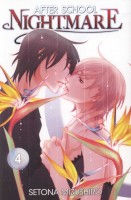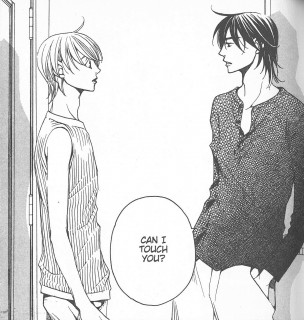 Creator: Setona Mizushiro
Creator: Setona Mizushiro
U.S. publisher: Go! Comi
ISBN: 9781933617336
Released: July 2007
Original release: 2006
Setona Mizushiro’s After School Nightmare is a ten-volume manga series, an intense psychological drama that explores issues of gender identity and sexuality in a fantastical sort of way. The manga incorporates elements of horror and is an effectively disconcerting work. Up until now, I had only ever read the first three volumes of After School Nightmare. Those volumes, initially borrowed from the library, left a significant impression on me and I immediately sought out a complete set of the entire series for my own. (Fortunately, though out-of-print in English, After School Nightmare is still relatively easy to find.) But while I found the start of the series to be compelling, years passed before I was able to gather the courage to read more of the manga. After School Nightmare, Volume 4 was first published in Japan in 2006 while Go! Comi released the English-language edition in 2007.
Mashiro is conflicted and confused, no longer certain of who he is as a person and struggling to determine just that. The special class that he must complete in order to graduate isn’t doing anything to ease his personal turmoil. In fact, it’s forcing him to confront his insecurities and fears. But the class is also making him stronger, encouraging him to face his feelings head on both inside the shared dreams of the class and outside of them. This also means facing Sou and his relentless advances without running away. While Mashiro is becoming more confident, he is also opening himself up to Sou’s aggressiveness and influence. Matters become even more complicated when their classmate Shinbashi witnesses them sharing a kiss. Shinbashi is in love with Mashiro’s girlfriend Kureha and cares for her more deeply than her boyfriend seems to. After seeing Sou and Mashiro together, Shinbashi mistakenly assumes Mashiro’s indecisiveness in his relationship with Kureha is due to his sexual orientation, never guessing that Mashiro’s true struggle is with his gender identity.
 Shinbashi has been an increasingly important character in After School Nightmare ever since he was introduced in the second volume, but the role he plays in the fourth volume is absolutely crucial. At this point in the series it doesn’t seem as though any of the characters will get a happy ending, and Shinbashi is no exception. While he may not be dealing with the repercussions of extreme physical, emotional, and mental abuse like those experienced by his fellow classmates, his story is still a tragic one. Shinbashi has become a friend and confidante of sorts to both Mashiro, who ought to be something more like a rival, and Kureha, despite her fear and hatred of men. It’s heartbreaking to see that because Kureha’s aversion is so severe, she and Shinbashi can only communicate through their cell phones; she can’t even stand to be in the same room with him. And while by nature Shinbashi is passive, he loves Kureha completely and would do anything for her, even to the point of self-destruction.
Shinbashi has been an increasingly important character in After School Nightmare ever since he was introduced in the second volume, but the role he plays in the fourth volume is absolutely crucial. At this point in the series it doesn’t seem as though any of the characters will get a happy ending, and Shinbashi is no exception. While he may not be dealing with the repercussions of extreme physical, emotional, and mental abuse like those experienced by his fellow classmates, his story is still a tragic one. Shinbashi has become a friend and confidante of sorts to both Mashiro, who ought to be something more like a rival, and Kureha, despite her fear and hatred of men. It’s heartbreaking to see that because Kureha’s aversion is so severe, she and Shinbashi can only communicate through their cell phones; she can’t even stand to be in the same room with him. And while by nature Shinbashi is passive, he loves Kureha completely and would do anything for her, even to the point of self-destruction.
A large part of After School Nightmare is focused on Mashiro’s search for self identity and how that identity is effected by the people around him and influenced by their relationships with him. Mashiro’s friendship with Shinbashi is a rather peculiar one that, oddly enough, somehow works. Where Shinbashi is self-sacrificing to a fault, Mashiro is incredibly self-centered, so concerned with and tangled up in his own problems that he often forgets to take into consideration how his actions may hurt others. An interesting thing about After School Nightmare is that while very few of the characters are easily likeable, I still find that I can empathize with them and can even identify with some of their plights. After School Nightmare continues to be an unsettling work with an intense and ominous atmosphere—I wouldn’t hesitate at all to describe it as a type of quiet, psychological horror—but there are occasional glimmers of hope that at least some of the characters will be able to overcome their troubles and fears.

It’s really interesting reading your reactions to this series, which parallel mine — up until I read the concluding volume. Now that I know how it all turns out, I’m not sure if I like the story *less*, but I sure think about it *differently*.
I will be fascinated to get your thoughts when you reach the end.
I know that there is a big twist coming. Though I’m largely unspoiled, I have a vague sense of what it may be, and I do know it made at least some readers really mad. I’m trying to approach the series one volume at a time at this point, but I suspect it may be a manga that I’ll have even more to say about in the end beyond my initial reviews.